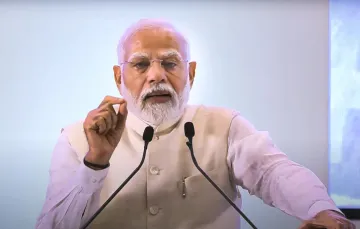'Faster decisions needed in atrocities against women cases:' PM Modi at 75 Years of SC conference
PM Modi said that 75 years of the Supreme Court is not just the journey of an institution but the journey of the Constitution of India and its constitutional values. This is the journey of India becoming more mature as a democracy.

Amid the growing outrage over the murder and rape of a female trainee doctor in Kolkata, Prime Minister Narendra Modi reiterated that many strict laws have been made in the country for the safety of women. He noted that atrocities against women and the safety of children are matters of grave concern for society and also mentioned that the country needs faster verdicts in cases of crimes against women to ensure their safety.
Addressing an event in Delhi on the 75th anniversary of the Supreme Court, PM Modi said, "Today, atrocities against women, the safety of children... are serious concerns of society. Many strict laws have been made in the country for the safety of women, but we need to make it more active.The faster the decisions are taken in cases related to atrocities against women, the greater assurance of safety half the population will get.".
PM Modi inaugurated the 2-day National Conference of District Judiciary at the Bharat Mandapam in New Delhi on Saturday. Union Minister Arjun Ram Meghwal, Chief Justice of India DY Chandrachud and President of Supreme Court Bar Association Kapil Sibal were also present at the event.
Speaking at the occasion, PM Modi said, "75 years of the Supreme Court, this is not just the journey of an institution. This is the journey of the Constitution of India and its constitutional values. This is the journey of India becoming more mature as a democracy. The people of India have never distrusted the Indian judiciary and the Supreme Court. Therefore, these 75 years of the Supreme Court further enhance the glory of India as the Mother of Democracy...I can say with confidence that SC has upheld the trust and faith we have in our institution."
"I can say with confidence that SC has upheld the trust and faith we have in our institution...Even in the dark period of emergency, the Supreme Court guaranteed our fundamental rights, and every time it was a question of national interest, the Supreme Court always guarded national integrity. In the Amritkaal of Independence, 140 crore countrymen have only one dream – Developed India, New India. New India, that is – a modern India in thinking and determination. Our judiciary is a strong pillar of this vision", stated PM Modi.
"To eliminate delays in justice, work has been done at many levels in the last decade. In the last 10 years, the country has spent about 8 thousand crore rupees for the development of judicial infrastructure. 75 percent of the amount spent on judicial infrastructure in the last 25 years has been spent in the last 10 years only," added PM Modi.
On this occasion, the PM also unveiled the stamp and the coin commemorating 75 years of the establishment of the Supreme Court of India.
CJI DY Chandrachud also presented a memento to Prime Minister Narendra Modi at the inaugural event.
While addressing the event CJI DY Chandrachud said, "Statistics on the National judicial data grid shows the district judiciary is often the final point of contact a litigant has with the law and not just the first contact. The Arc of pending cases is defined as a triangle and it is larger at the base and tapers towards the end. many litigants are unable to afford legal representation. the quality of our work and the conditions in which we provide justice determines if the public has confidence in us and is a test of our accountability. spine is the core of our nervous system and thus we must stop calling it subordinate judiciary. we must shed the colonial mindset of calling it subordinate. they are administrators of the court, mentors to young judges and above all protect of rights of those who possess them. they oversee the development of infrastructure work with para-legal etc. They play a meaningful role in interaction with the bar."
The two-day conference, organised by the Supreme Court of India, is being attended by more than 800 participants from the district judiciary of all States and Union Territories.
The five working sessions will deliberate and discuss issues related to the District Judiciary such as infrastructure, human resources, inclusive courtrooms for all, judicial security and judicial wellness, caste management and judicial training.
The session on "Infrastructure and Human Resources" aims to explore ways to enhance the infrastructure and human capital for the district judiciary, stated the press statement issued by the Supreme Court.
(Inputs from agencies)